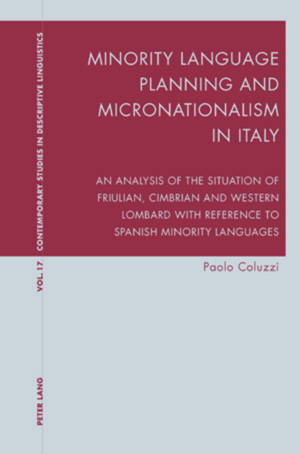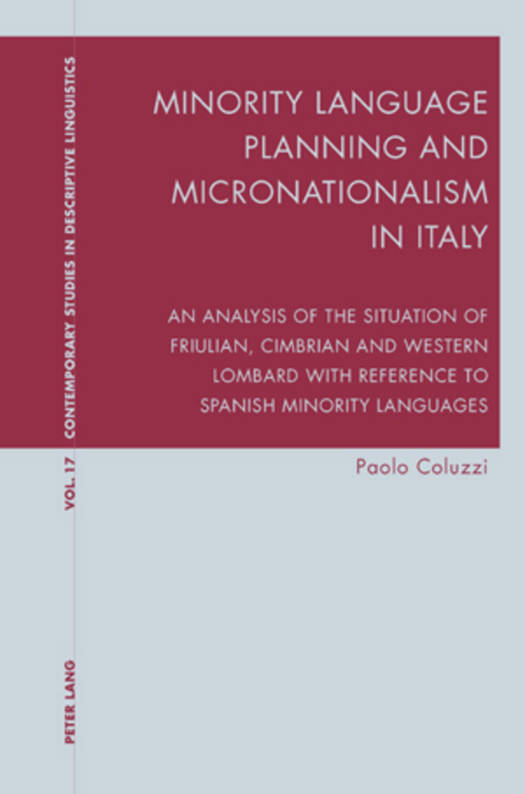
Door een staking bij bpost kan je online bestelling op dit moment iets langer onderweg zijn dan voorzien. Dringend iets nodig? Onze winkels ontvangen jou met open armen!
- Afhalen na 1 uur in een winkel met voorraad
- Gratis thuislevering in België vanaf € 30
- Ruim aanbod met 7 miljoen producten
Door een staking bij bpost kan je online bestelling op dit moment iets langer onderweg zijn dan voorzien. Dringend iets nodig? Onze winkels ontvangen jou met open armen!
- Afhalen na 1 uur in een winkel met voorraad
- Gratis thuislevering in België vanaf € 30
- Ruim aanbod met 7 miljoen producten
Zoeken
Minority Language Planning and Micronationalism in Italy
An Analysis of the Situation of Friulian, Cimbrian and Western Lombard with Reference to Spanish Minority Languages
Paolo Coluzzi
€ 85,95
+ 171 punten
Omschrijving
Issues of language planning and minority nationalism or «micronationalism» are becoming increasingly important in a globalized world. Yet minority language planning in Italy and its relation to minority nationalism has so far attracted relatively limited academic attention, despite the particularly interesting changes that have taken place since Law 482 on the protection of minority languages was passed in 1999. This book presents the situation in Italy in three case studies and compares them with similar cases in Spain: Friulian (compared with Galician), Cimbrian (compared with Aranese) and Western Lombard (compared with Asturian). Analysis of these case studies is preceded by a clear and thorough introduction to terminology, legislation in the two countries, nationalism, the discipline of language planning and bilingual education, both in general terms and with specific reference to the Italian and Spanish cases. This first part introduces and defines the crucial distinction between minority and regional languages, between macro and micronationalism, both in their conservative and progressive strands, and between majority and minority language planning, among other things.
Specificaties
Betrokkenen
- Auteur(s):
- Uitgeverij:
Inhoud
- Aantal bladzijden:
- 352
- Taal:
- Engels
- Reeks:
- Reeksnummer:
- nr. 17
Eigenschappen
- Productcode (EAN):
- 9783039110414
- Verschijningsdatum:
- 18/06/2007
- Uitvoering:
- Paperback
- Formaat:
- Trade paperback (VS)
- Afmetingen:
- 150 mm x 220 mm
- Gewicht:
- 509 g

Alleen bij Standaard Boekhandel
+ 171 punten op je klantenkaart van Standaard Boekhandel
Beoordelingen
We publiceren alleen reviews die voldoen aan de voorwaarden voor reviews. Bekijk onze voorwaarden voor reviews.











